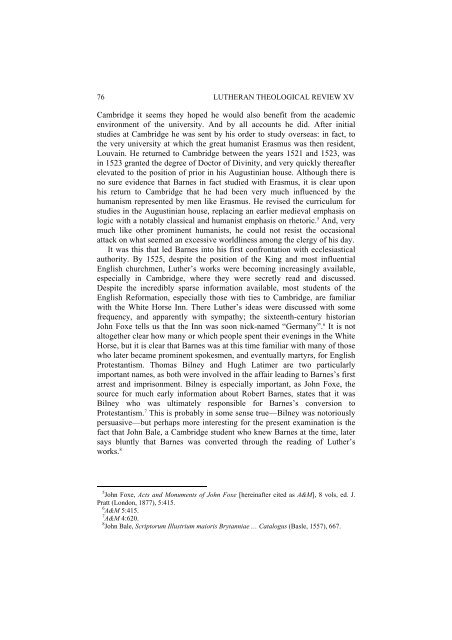LUTHERAN THEOLOGICAL REVIEW - Brock University
LUTHERAN THEOLOGICAL REVIEW - Brock University
LUTHERAN THEOLOGICAL REVIEW - Brock University
You also want an ePaper? Increase the reach of your titles
YUMPU automatically turns print PDFs into web optimized ePapers that Google loves.
76 <strong>LUTHERAN</strong> <strong>THEOLOGICAL</strong> <strong>REVIEW</strong> XV<br />
Cambridge it seems they hoped he would also benefit from the academic<br />
environment of the university. And by all accounts he did. After initial<br />
studies at Cambridge he was sent by his order to study overseas: in fact, to<br />
the very university at which the great humanist Erasmus was then resident,<br />
Louvain. He returned to Cambridge between the years 1521 and 1523, was<br />
in 1523 granted the degree of Doctor of Divinity, and very quickly thereafter<br />
elevated to the position of prior in his Augustinian house. Although there is<br />
no sure evidence that Barnes in fact studied with Erasmus, it is clear upon<br />
his return to Cambridge that he had been very much influenced by the<br />
humanism represented by men like Erasmus. He revised the curriculum for<br />
studies in the Augustinian house, replacing an earlier medieval emphasis on<br />
logic with a notably classical and humanist emphasis on rhetoric. 5 And, very<br />
much like other prominent humanists, he could not resist the occasional<br />
attack on what seemed an excessive worldliness among the clergy of his day.<br />
It was this that led Barnes into his first confrontation with ecclesiastical<br />
authority. By 1525, despite the position of the King and most influential<br />
English churchmen, Luther’s works were becoming increasingly available,<br />
especially in Cambridge, where they were secretly read and discussed.<br />
Despite the incredibly sparse information available, most students of the<br />
English Reformation, especially those with ties to Cambridge, are familiar<br />
with the White Horse Inn. There Luther’s ideas were discussed with some<br />
frequency, and apparently with sympathy; the sixteenth-century historian<br />
John Foxe tells us that the Inn was soon nick-named “Germany”. 6 It is not<br />
altogether clear how many or which people spent their evenings in the White<br />
Horse, but it is clear that Barnes was at this time familiar with many of those<br />
who later became prominent spokesmen, and eventually martyrs, for English<br />
Protestantism. Thomas Bilney and Hugh Latimer are two particularly<br />
important names, as both were involved in the affair leading to Barnes’s first<br />
arrest and imprisonment. Bilney is especially important, as John Foxe, the<br />
source for much early information about Robert Barnes, states that it was<br />
Bilney who was ultimately responsible for Barnes’s conversion to<br />
Protestantism. 7 This is probably in some sense true—Bilney was notoriously<br />
persuasive—but perhaps more interesting for the present examination is the<br />
fact that John Bale, a Cambridge student who knew Barnes at the time, later<br />
says bluntly that Barnes was converted through the reading of Luther’s<br />
works. 8<br />
5 John Foxe, Acts and Monuments of John Foxe [hereinafter cited as A&M], 8 vols, ed. J.<br />
Pratt (London, 1877), 5:415.<br />
6 A&M 5:415.<br />
7 A&M 4:620.<br />
8 John Bale, Scriptorum Illustrium maioris Brytanniae … Catalogus (Basle, 1557), 667.













